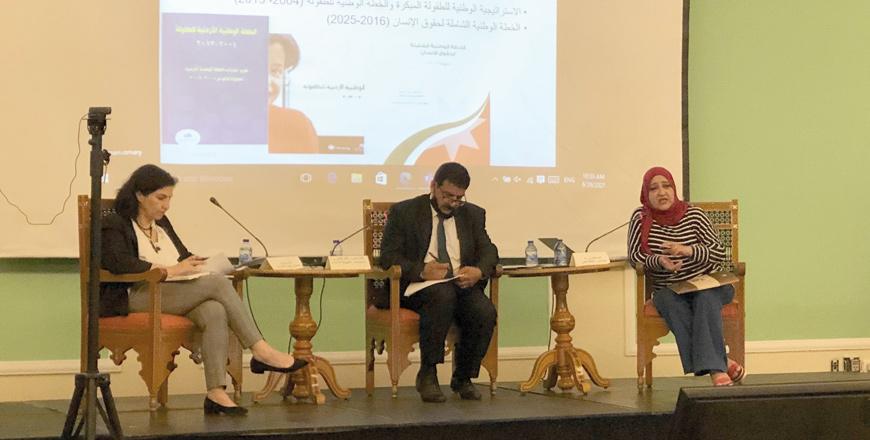You are here
Workshop seeks to mobilise support for draft law on children’s rights
By Batool Ghaith - Jun 27,2021 - Last updated at Jun 27,2021

The National Council for Family Affairs kicked off a two-day workshop on Saturday in collaboration with UNICEF to mobilise support for the draft law on children’s rights (Photo by Batool Ghaith)
DEAD SEA — The National Council for Family Affairs (NCFA) kicked off a two-day workshop on Saturday in collaboration with UNICEF to mobilise support for the draft law on children’s rights.
A number of deputies, representatives of civil society organisations, and experts attended the event in the Dead Sea area.
According to a statement released by the council, the workshop aims to develop a policy paper demonstrating the importance of the law as one of the aid tools for investing in childhood.
The workshop also highlighted the importance of contributing to the development of legislation that takes into account the needs of the family in order to achieve the highest guarantees to empower the family and its members and preserve its entity and stability, according to the statement.
In his opening speech, NCFA Secretary General Mohammad Miqdadi highlighted that Jordan has made significant progress in the field of child protection, services, and care since the 1990s.
Jordan has enacted and amended numerous laws to improve child protection and services in accordance with international charters and covenants ratified by the Kingdom, the most important of which is the Convention on the Rights of the Child, which Jordan was one of the first countries to sign, Miqdadi said.
He noted that the law’s function, if passed, is enhancing, developing, and consolidating services and child protection in accordance with the government’s sustainable development goals for improving service quality.
He said that the Children’s Rights Law is a translation of the 2011 constitutional amendments, which added the fifth item to Article 6 of the Constitution, which states: “The law protects motherhood, childhood, and old age, takes care of young people and people with disabilities, and protects them from abuse and exploitation.”
“The National Strategy for Human Resources Development established a strategic aim of ensuring that all children get high-quality early education and experiences that contribute to their development and increase their readiness to participate in basic school by the year 2025,” Miqdadi noted.
Miqdadi stressed the importance of high-quality education, healthcare, exceptional social, judicial and legal services for effective child protection.
“We discovered a number of socioeconomic issues, including school dropouts, child labour, underage marriage, abuse, neglect, and parents’ or caregivers’ failure to provide essential services to their children,” he added.
Miqdadi indicated that each year, a large amount of money is allocated, both from the public treasury and from donor institutions, to try to resolve these growing problems.
UNICEF’s Chief Child Protection Mariyampillai Mariyaselvam praised Jordan’s role in protecting children and preserving their rights.
“Jordan is the Middle Eastern country with the most international human rights treaties ratified, and it has made significant efforts to align its legal structure with international treaties to secure legal protection for children,” he said.
In its concluding observations on Jordan’s implementation of the Convention on the Rights of the Child 2014, the Committee of Children’s Rights recommended and urged Jordan “to enact, without further delay, a draft child rights law and to ensure that it includes all of the rights and principles set out in the convention,” according to Mariyaselvam.
“UNICEF prioritises support for Jordan to improve its legislative framework in order to improve compliance with the Convention on the Rights of the Child. UNICEF also assisted in the development of a draft Child Rights Law, Juvenile Law, and bilateral laws on domestic violence, all of which we presented to be approved in 2019,” Mariyaselvam noted.
Mariyaselvam said that the proposed Child Rights Law draft is an “important component” of the legislative framework required in Jordan to make children’s rights a reality. It will also accelerate Jordan’s progress toward reaching the Sustainable Development Goals.
“Although the Child Rights Law implementation will incur additional costs, the advantages of this investment, however, exceed the disadvantages, and these advantages will be recognised in the short-, medium-, and long-terms,” he continued.
“UNICEF is proud of its active relationship with all relevant national institutions, and I would like to reaffirm UNICEF’s commitment to continue assisting Jordan’s government in improving efficiency in the health, education, protection, and social sectors in the best interests of all Jordanian children, and to prioritise the child’s best interests in all decisions and actions,” Mariyaselvam said.
Related Articles
AMMAN — Recent evaluations carried out by UNICEF have shown that a 20 per cent of the children in Jordan are still suffering from multidimen
AMMAN — The National Council for Family Affairs (NCF) and UNICEF on Wednesday organised a consultative meeting over the 2023 action plan on
AMMAN — The National Council for Family Affairs (NCFA) on Wednesday held a workshop aimed at discussing the draft law on children’s rights,











